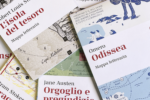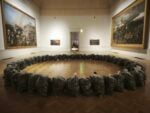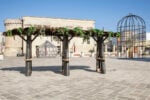54. Biennale – Padiglione dell’Asia Centrale
Il progetto Lingua Franca rappresenterà l’Asia Centrale alla Biennale di Venezia.
Comunicato stampa
The exhibit of the Central Asia pavilion Lingua Franca/Франк Тили presenting works of eleven artists from four countries of the region is a comprehensive study of contemporary artistic practices as a kind of lingua franca – language of global communication. The exhibit’s curators propose two approaches deconstructing one another. The first one inspired and motivated by the practices of the early 20th century avant-garde that viewed creation of universal means of communication amongst its major aspirations, presents art works and projects as individual artistic strategies to convert the local issues and contexts into universally comprehensive visual language. These approaches, presented in the exhibit’s major section, Lingua Franca. Experiences of Universal, involve atomization and miscegenation, language of metaphors and archetypes, tracing back to avant-garde, as well as a strategy that appeals to the universality of unformulated order, which was marked in the exhibit as l’innommable.
Lingua franca inspires the metaphor of overall language, but historically and in contemporary practice it remains the language of Franks (франк тили, if translated into Turkic languages of Central Asia), foreigners, others, aliens. This aspect of arts, taken as a model for universal communication, is explored in another section of the exhibition - Франк тили. Foreign Affairs. Projects that built up this part of the exhibit reveal unobvious or sometimes just unnoticed expressions of power, hegemony and domination that run through languages, arts, media and situations that claim to be universal and comprehensive.
Special Events
The Desert of Forbidden Art
Screening of the film and Q&A with the authors, Amanda Pope and Tchavdar Georgiev
1st of June, 2011, 18:30
Venue:
Auditorium Santa Margherita, Università Ca' Foscari Venezia, Dorsoduro 3246 – 30123
Special event of the Central Asia Pavilion in 2011 is a presentation of the new documentary by LA based cinematographers Amanda Pope and Tchavdar Georgiev The Desert of Forbidden Art (2010). This events is a result of cooperation between Central Asia Pavilion, authors of the film and departments of Università Ca' Foscari Venezia - CSAR (Center for Russian Studies) and Ca Foscari Cinema. The Desert of Forbidden Art features...
Read more ›››
Discussion
4th of June, 2011, 14:00
Venue:
Central Asia Pavilion, Palazzo Malipiero, San Marco 3199 – 3201
The etymology of the term Lingua Franca derives from the name of the historical, mixed language, which developed through trade contacts between Europe, North Africa and Asia. Lingua Franca is an Italian translation of the Arabic expression ‘Frankish language’, because starting with the crusades the Arabs called all Europeans ‘Franks’. Today...



